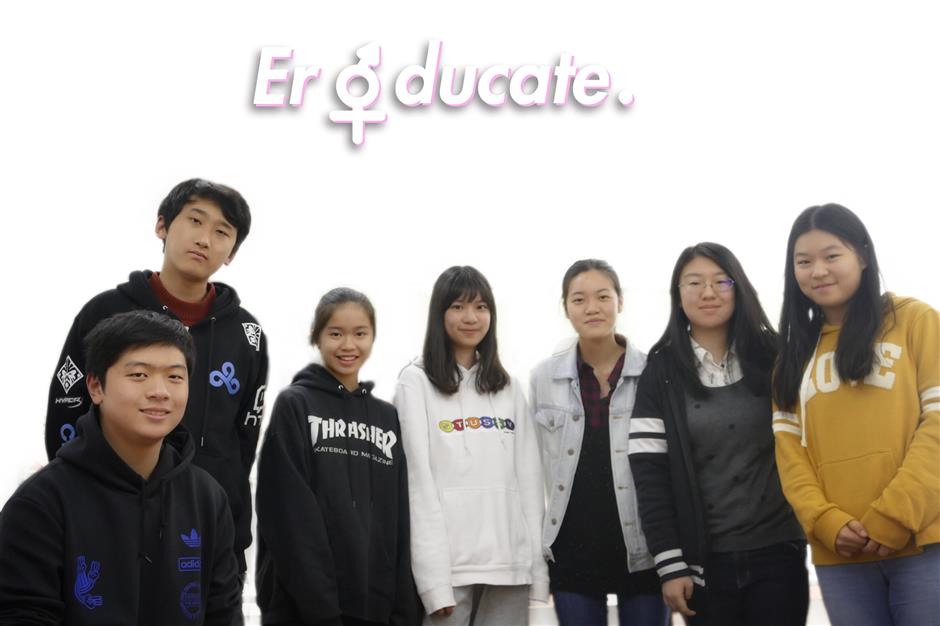How much do adolescents really know about sex?

The Eroducate team from the international division of Shanghai High School
An educational video game about sexual behavior, adolescent pregnancy and sexually transmitted diseases has gone viral on the game platform Steam. Perhaps most surprising to people is that the game was produced by seven Shanghai high school students, aged 16 and 17.
“Sex education has been a taboo subject in China, both in schools and at home,” said Sharon Zhao, a member of the student team calling itself Eroducate — a combination of eroticism and education. “As both schools and parents take an evasive approach, we wanted to help our peers get the right information about sex.”
The students, who attend the international division of Shanghai High School, got the idea when they were considering topics for their participation in the innovation competition “China Thinks Big” last year.
“We saw some reports about teen pregnancy and sexually transmitted diseases,” said Zhao. “We believe that adolescents need to know how to protect themselves, and the whole society needs to understand the importance of sex education.”
The team conducted a survey that found many young people acquire their knowledge about sex from their peers or from the Internet.
“But some of the information might be wrong or exaggerated,” said Zhao. “So, we consulted with professional psychology teachers, doctors and procurators who are familiar with sexually related cases to ensure that the information we disseminated was correct.”
They decided to use a video game to approach young people.
The seven students wrote the game script, choosing daily experiences adolescents are likely to face. They shot the video themselves, and to diversify the settings, they used a villa of one team member and even rented an apartment.
“The shooting was funny and sometimes embarrassing because we had no sexual experience,” said Zhao. “In one episode, when we wanted to show a young man kissing a young woman, he was actually kissing the camera while the cinematographer was bent over him. It was really funny.”
Their game “Self-Reliance” is neither delicate nor complicated. Rather, it’s a very simple technique. Game players watch a video and click on options from time to time. Their choices lead to different results. For example, at the beginning of the game, when a young man and a young woman decide to have sex, two options appear on the screen: buy a condom or not. If the player chooses “not buy,” the game goes on to show the young woman pregnant. Then team members come on screen to discuss the value of contraception.
If players make the right choices throughout the whole game, they will win “awesome” in the end.
The videos contain no vulgar content, such as low-cut clothing. But the team still faced some pushback when they sought publication. Of the seven game platforms they contacted, five turned them down because the topic was too “sensitive.” Another platform said it would review the matter. The game made its debut on Steam on February 7.
Since then, the game has been downloaded about 200,000 times and more than 400 players have left reviews, with 88 percent positive responses.
Some players criticized the students’ unprofessional performances and said the information imparted on the videos is pretty commonly known. Others suggested improvements to the game, such as the addition of an exit button. But most praised the team for their efforts to highlight the lack of sex education game in China and make a difference in the adolescent world.
Judges of the “China Thinks Big” competition thought so, too, giving the team the Young Innovator Award.
Zhao said team members learned a lot in the process.
“Through this program, we learned various methods of contraception and misunderstandings about sexually transmitted diseases,” she said. “It was the first time I saw how influential the Internet is.”
She added, “It was also the first time I had received so much encouragement and recognition from so many strangers. I also heard opinions that I had never thought about before. Both positive and negative criticism is valuable for us in improving our program.”
The students are especially grateful for the support they received from the school and their parents.
The school invited them to talk about their research and sex education in front of a student and faculty assembly.

The students win the Young Innovator Award.















